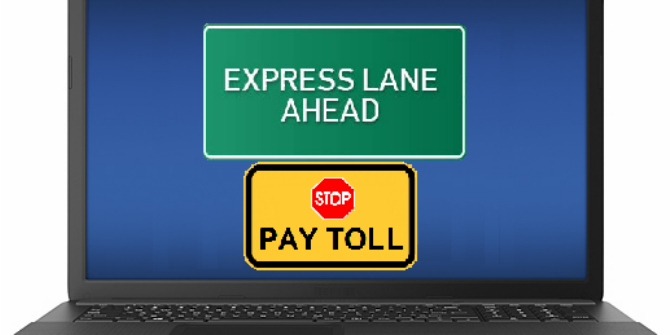
 On 27 October, the European Parliament approved a new regulation which will abolish roaming charges across the EU. However, in the same regulation, there was also discussion of the more technical question of net neutrality, a thorny issue which centres on the principle of equal treatment for all web traffic. In this piece, Chris Marsden, Professor of Internet and Media Law at the University of Sussex, and Luca Belli, Researcher at the Center for Technology and Society, explain the important impact of the new Regulation on web users across the EU, and ask what challenges we may face in the future as a result.
On 27 October, the European Parliament approved a new regulation which will abolish roaming charges across the EU. However, in the same regulation, there was also discussion of the more technical question of net neutrality, a thorny issue which centres on the principle of equal treatment for all web traffic. In this piece, Chris Marsden, Professor of Internet and Media Law at the University of Sussex, and Luca Belli, Researcher at the Center for Technology and Society, explain the important impact of the new Regulation on web users across the EU, and ask what challenges we may face in the future as a result.
After more than two years of gestation, on 27 October a new net neutrality law was approved by the European Parliament. As the new Regulation states, the safeguard of equal and non-discriminatory treatment of internet traffic became urgent and necessary because “a significant number of end-users are affected by traffic management practices which block or slow down specific applications or services”. Indeed, the spread of such discriminatory practices had been clearly demonstrated by a joint investigation of the Body of European Regulators of Electronic Communications (BEREC) and the European Commission in 2012.
Reactions to the vote have been quite heterogeneous, with European Commissioners cheering the rules as excellent news whilst several NGOs have stressed the existence of worrying loopholes.
Good news, bad news and do not mention the N-word
Net neutrality is the principle mandating that internet traffic be managed in a non-discriminatory fashion, in order to fully safeguard internet users’ rights. Although many net neutrality elements have been included in the new regulation, the lack of any explicit mention of the net neutrality principle is notable.
Rather than unequivocally affirming the three pillars of net neutrality, i.e. no blocking, no throttling and no paid prioritisation, the EU policymakers enshrined only the first two components in the regulation, thus tempering neutrality into a less principled vague “open internet”. Who can disagree with an open internet? Telecoms companies very certainly disagreed with strict net neutrality.
The good news for users is that, starting from the publication of the regulation, Europeans will have the “right to access and distribute information and content, use and provide applications and services, and use terminal equipment of their choice, irrespective of the end – user’s or provider’s location or the location, origin or destination of the information, content, application or service, via their internet access service” according to Article 3 of the Regulation. Associated with this right is the Internet Access Service Providers’ (IAPs) obligation to “treat all traffic equally” with reasonable traffic management that should be “transparent, non-discriminatory and proportionate” and, very importantly, “shall not be based on commercial considerations but on objectively different technical quality of service requirements of specific categories of traffic”.
This is an important step forward for those Europeans who were lacking basic protections. However, some crucial issues remain unclear and, frequently, the devil is in the details. The enforcement of the new regulation formally takes effect after its publication in the Official Journal, but will in practice begin in approximately September 2016, nine months after publication. In that time, BEREC – which consists of the 28 national regulators meeting in Riga, Latvia – will have to issue specific detailed guidelines to their component national regulators, to ensure that IAPs do not elude the new rules with particular regard to congestion management, specialised services and zero rating. BEREC’s consultation on its annual work programme closes on 30 October.
The details
Impending congestion? It is unclear what kind of traffic management will be possible in order to “prevent impending network congestion”. This will be considered a legitimate exception to the non-discrimination rule but it will be very difficult to foresee what may be qualified as “impending congestion” and what could be reasonable measures to “prevent” or even to define the imminence of “impending congestion”.
Specialised services The European Commission has officially stated that “paid prioritisation in the open internet will be banned”, but the provision of guaranteed-quality services i.e. “services other than internet access services which are optimised for specific content, applications or services, or a combination thereof” is explicitly allowed. It will be, therefore, the responsibility of national regulators to make sure that such services are provided only when “the network capacity is sufficient to provide them in addition to any internet access services provided”.
In the absence of a clear separation requirement between open access and guaranteed-quality services, the evaluation of network capacity becomes a critical element to avoid abusive conduct, but no indication on how to assess “sufficiency” has been provided by the regulation. If your internet access speed and monthly allowance does not change until 2020, you have the same conditions as now which means you are not impeded – but you will not benefit from the 20% average annual growth in both speed and capacity which has been achieved in the past. Is a static connection acceptable as not “impeding” you?
Zero-rating Zero rating (or sponsored data plans) is a commercial practice used by some IAPs, consisting in the imposition of data caps, i.e. limits to monthly data volumes, and the parallel exemption of selected zero-rated applications from such caps. The data consumption of the zero-rated applications may be sponsored by the IAP itself or by the application provider, depending on the specific commercial arrangement.
This practice has the concrete potential to create a two-tier internet, since non zero-rated applications may suffer a considerable disadvantage compared to the zero-rated ones. These could be rival social networks, video or other media providers, or messaging apps.
The new regulation does not specifically address zero rating but, as discussed, it does not allow traffic management which is “based on commercial considerations”. Both proponents and opponents of zero-rating may find arguments in the new regulation and the debate is far from concluded.
What happens next?
It is not just in the European Union where regulators have passed laws but seem uncertain how to address traffic management rules, zero rating and specialised services. Other nations in the same quandary include Brazil, Canada, the United States, and India. The regulators are looking to each other for best practices in implementing the laws that are already in place.
The upcoming United Nations Internet Governance Forum in João Pessoa on 10-13 November will provide a good platform for a well-informed and constructive debate in both the main session and several workshops, where all the involved stakeholders should try to discuss and propose sustainable solutions.
This article gives the views of the author and does not represent the position of the LSE Media Policy Project blog, nor of the London School of Economics and Political Science.






1 Comments